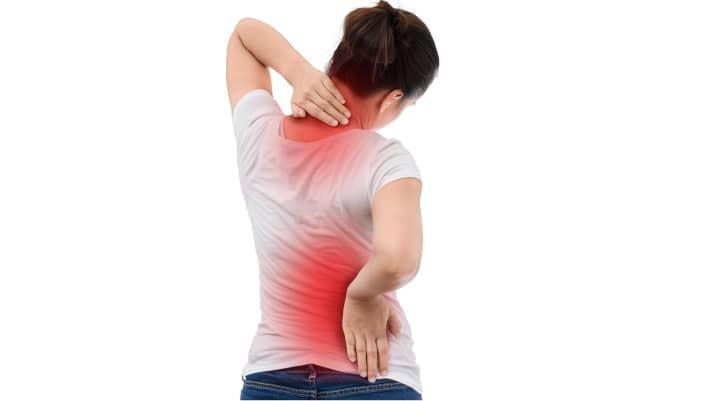Everything You Need to Know about Spinal Cord Pain
November 15, 2022
Spinal cord pain, also called lumbar (back) pain, is a common disorder of the spine, muscles, joints, blood vessels, tendons, ligaments, and nerve roots around it or the discs between the vertebrae and neck.
Spinal cord pain can be mild, severe, short-lived, or chronic. In some cases, spinal cord pain can be an early sign of underlying serious health complications. So, almost all cases of spinal cord pain require immediate medical consultation.
What Are the Main Causes of Spinal Cord Pain?
Physical trauma and many diseases and medical conditions can cause spinal cord pain. Some potential causes of spinal cord pain include
-
Muscle Strain and Sprain: These are the most common causes of spinal cord pain. Repetitive straining physical activities or bending over for long periods can put pressure on the spine and lead to back pain.
-
Osteoporosis: It is a bone disease that makes the bones weak and brittle. This can cause pain, stiffness, inflammation, and bone fractures.
-
Arthritis: It is a degenerative disease that affects the joints. Individuals aged above 40 years are more prone to developing arthritis.
-
Physical Injury: Physical injuries such as road accidents, sports injuries, or other violent encounters can damage the sensitive nerves in the spine. Sometimes this type of spine injury can lead to chronic or fatal complications and require immediate medical attention.
-
Cancer: In some rare cases, spinal cord pain can signify vertebral cancer. There are many treatment options for spinal cord tumours, including medication, surgery, and radiation therapy.
-
Cauda Equina Syndrome: This is a medical condition characterised by the malfunctioning or compression of nerve roots in the spine. This can also cause pain in the spinal cord.
Who Are At Increased Risk of Developing Spinal Cord Pain?
Anyone can have spinal cord pain, but individuals with certain conditions and lifestyles are at an increased risk of developing the pain. The causes include
-
Poor posture
-
Sedentary lifestyle
-
Obesity
-
Fractures
-
Prolonged sitting
-
Herniated or slipped spine
-
Age above 40 years
-
Genetics
-
Lifting heavy weight for long periods
-
Autoimmune diseases
What Are the Different Types of Spinal Cord Pain?
Based on the duration and intensity of the spinal cord pain, it is classified as
-
Acute (Short-Term) Spinal Pain: Acute spinal cord pain lasts from a few days to a few weeks and resolves itself without any complicated treatment.
-
Chronic Spinal Pain: Chronic spinal pain is characterised by pain lasting for ten weeks or longer. This type of spinal pain may severely affect one's life and require immediate treatment to avoid complications.
Based on the location of the spinal cord pain, it is classified as
-
Cervical Spine Pain: This type of pain is felt in and around the neck.
-
Thoracic Spine Pain: This type of pain is felt in regions of the rib cage.
-
Lumbar Spine Pain: This type of pain is felt in the lower back.
-
Sacrum and Coccyx Pain: This type of pain is felt at the bottom of the spine.
What Are the Signs That Medical Attention Might Be Needed?
As a general rule, spinal pain accompanied by fever, vomiting, or weakness in the legs may indicate an underlying medical condition and must be treated urgently.
Other signs that imply that immediate medical attention is needed are as follows:
-
Stiffness or restricted movement of the spine
-
Radiating or burning sensation in the back
-
Unexplained weight loss
-
Change in bowel movement
-
Numbness at a particular spot
-
Muscular spasms
-
Posture problems
How is Spinal Cord Pain Diagnosed?
One or more of the following tests may help diagnose the root cause of spinal cord pain:
-
X-ray: X-ray images can help doctors locate fractures, nerve problems, alignment complications, and structural deformities in the spine.
-
Blood Tests: Blood tests can help identify infection and underlying deficiencies.
-
CT Scan: CT scans can reveal problems in the muscles, discs, ligaments, nerves, and blood vessels of the spine.
-
Electromyography (EMG): An EMG test measures the electrical impulses produced by the nerves. Abnormal electrical impulses can indicate nerve compression, which may occur with spinal stenosis (spinal narrowing) or a herniated disc (ruptured or slipped disc).
What Are the Different Treatment Options for Spinal Cord Pain?
The severity and root cause of spinal cord pain dictate the nature of spinal cord treatment. Some standard treatment options for spinal cord pain include
Nonsurgical Options
-
Medications: Over-the-counter medication like pain relievers and nonsteroidal anti-inflammatory drugs, such as ibuprofen or naproxen, can relieve the symptoms of spinal cord pain.
-
Physical Therapy: Physical therapy such as stretching exercises, flexibility training, core strengthening, and retraining posture practices can help reduce mild to moderate spinal cord pain.
Surgical and Interventional Options
Surgery is usually reserved for patients with severe structural abnormalities who have not responded to nonsurgical medication and physiotherapy.
Some popular surgery options for severe spinal cord-related problems include
-
Spinal Fusion: This is an orthopaedic surgical technique that corrects structural deformities in the spinal joints.
-
Laminectomy: This is a surgical technique that relieves compression and narrowing of the spinal cord.
-
Diskectomy: This is a procedure through which the damaged part of a herniated disc is removed.
-
Disc Replacement: This involves surgical removal of the diseased or injured portion of the disc.
-
Disc Arthroplasty: This is a joint replacement procedure to treat degenerated spinal discs.
What Are the Benefits of Spinal Cord Treatment?
The benefits of getting one's spinal cord treated are many. Some of the common benefits include
-
Reduced chronic back pain and inflammation
-
Improved posture and functional stability of the spine
-
Enhanced quality of life
-
Prevention of further complications like bone fractures or nerve damage
What Are the Possible Complications of a Spinal Cord Surgery?
As with all major surgeries, spinal cord surgery also poses certain risks and complications. Some of these include
-
Nerve injury
-
Damage to blood vessels and muscles in and around the spine
-
Anaesthesia risk
-
Bleeding or blood loss during surgery
-
Numbness or loss of sensation at the treated site
How to Prevent Spinal Cord Pain?
There are no definite ways to prevent spinal cord pain. However, there are certain measures and lifestyle changes that can help reduce its occurrence. Some measures one can take are
-
Avoid heavy-lifting
-
Keep check of the blood pressure and body mass index
-
Maintain proper posture
-
Maintain a healthy diet
-
Quit sedentary lifestyle
-
Practice stretching and yoga
What Are the Home Remedies for Spinal Cord Pain?
There are several home remedies to reduce lower backache and discomfort. Some of the most effective home remedies for spinal cord pain are as follows:
-
Oil Massage: This can help improve blood circulation in the affected region, boosting healing.
-
Cold and Heat Therapies: Placing cold and heat packs on the affected area can reduce inflammation and pain.
-
Acupuncture Therapy: This can help stretch tense or sore muscles and improve inflammatory healing responses.
Conclusion
The spinal cord comprises sensitive bones, blood vessels, and the body's central nervous system. So, any spine injury can have a serious impact on the nerves and muscles. Because of this, it is always best not to neglect early back pain symptoms.
Thanks to modern diagnostic tools and treatment options, many spinal cord-related ailments can now be treated and prevented at an earlier stage.
Dr. Utkarsh Prabhakar Pawar
MBBS, MS, DNB...
| Experience | : | 5 Years |
|---|---|---|
| Speciality | : | Orthopaedics and Trauma |
| Location | : | Mumbai-Chembur |
| Timings | : | Mon - Sat : 1:00 PM to 3:00 PM |
Dr. Kailash Kothari
MD,MBBS,FIAPM...
| Experience | : | 23 Years |
|---|---|---|
| Speciality | : | Orthopaedics and Trauma |
| Location | : | Mumbai-Chembur |
| Timings | : | Mon - Sat : 3:00 PM to 8:00 PM |
Dr. Om Parshuram Patil
MBBS, MS – Orthopaedics, FCPS (Ortho), Fellowship in Spine...
| Experience | : | 21 Years |
|---|---|---|
| Speciality | : | Orthopaedics and Trauma |
| Location | : | Mumbai-Chembur |
| Timings | : | Mon - Fri : 2:00 PM to 5:00 PM |
Dr Ranjan Burnwal
MS - Orthopedics...
| Experience | : | 10 Years |
|---|---|---|
| Speciality | : | Orthopaedics and Trauma |
| Location | : | Mumbai-Chembur |
| Timings | : | Mon - Sat: 11:00 AM to 12:00 PM & 6:00 PM to 7:00 PM |
Dr. Sudhakar Williams
MBBS, D. Ortho, Dip. Ortho, M.Ch...
| Experience | : | 34 Years |
|---|---|---|
| Speciality | : | Orthopaedics and Trauma |
| Location | : | Chennai-MRC Nagar |
| Timings | : | Tue & Thur : 9:00 AM to 10:00 PM |
It depends on the cause and severity of the pain. Minor cases of spinal cord pain are treated by general physicians. Whereas, severe cases may require collaborated treatment from neurologists, neurosurgeons, orthopaedic surgeons and orthopedists.
NOTICE BOARD
CONTACT US
CONTACT US
 Book Appointment
Book Appointment








.svg)
.svg)
.svg)
.svg)








